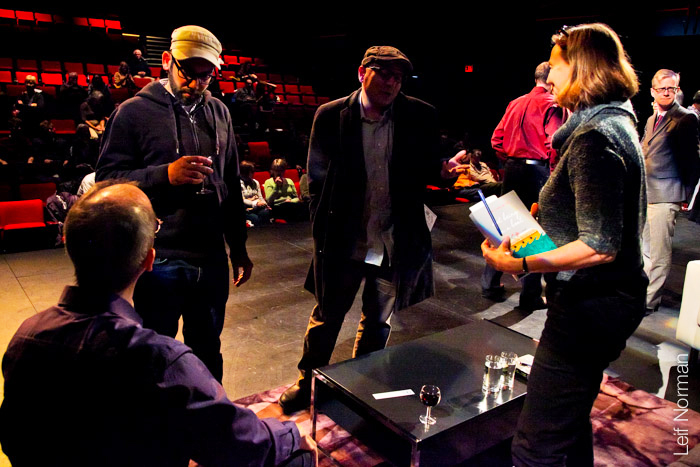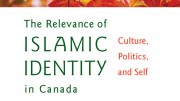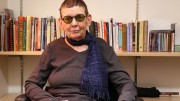Canadian literary legend Margaret Atwood brought weighty topics with wit to the Royal Manitoba Theatre Centre Sept. 30.
An Evening with Margaret Atwood wrapped up the Winnipeg International Writers Festival’s Thin Air 2019 event.
Atwood is currently touring The Testaments, the sequel to her 1985 novel The Handmaid’s Tale.
The sequel takes place 16 years after The Handmaid’s Tale and shows how the theocratic regime of the Republic of Gilead is beginning to disintegrate.
The novel also takes place outside of the theocratic regime, where some characters have escaped to the safe zone.
The Testaments follows three narrators — two young women and one older character, Aunt Lydia.
The sequel comes over 30 years after The Handmaid’s Tale.
The literary classic saw a resurgence after its adaptation into a mini-series, presumably feeding off the fears and anxieties surrounding the 2016 election of U.S. President Donald Trump and the rise of alt-right politics.
Atwood began her talk with a reading from the first chapter of The Testaments, then went on to discuss her novel and its sources of inspiration from reality.
“For years people said ‘Will you write a sequel?,’ meaning, ‘Can we pick up the story of Offred and continue on?’” she said.
“And I always said ‘No’ […] but then we entered the 21st century and things start going a bit pear-shaped in the world.”
Atwood wrote The Handmaid’s Tale during a tumultuous time for women’s rights.
“Those rights started to be acquired more after about 1970, and in 1980 there was a pushback against those acquisitions, so I started thinking about writing The Handmaid’s Tale in 1981,” she said.
The fears and anxieties surrounding the possibility of misogynistic totalitarianism in the U.S. spurred inspiration for The Testaments.
From the 9/11 terrorist attacks and conservative climate change deniers to the controversial election of Donald Trump, Atwood saw that the U.S. was veering into dangerous territory, with people seeking asylum from the country in Canada.
She draws parallels between the Canada and U.S. divide, and the safe zone and the Republic of Gilead in The Testaments.
“We don’t live in the land of best, in fact nobody lives in the land of best, but you can live in the land of ‘least worst,’” Atwood said.
“Of course we don’t live in the land of best, there are a lot of things we have done wrong as a country […] and attempts made to correct those things that don’t always work out, and that is what the land of least worst looks like.”
In both The Handmaid’s Tale and The Testaments, the Republic of Gilead is reeling from ecological devastation. According to Atwood, environmental exploitation and the rollback of women’s rights are intertwined.
“If the ideology is total greed, then everything else in relation to you and your greed is an exploitable resource, and that would include women,” she said.
Atwood is interested in the rise and fall of authoritarian regimes and incorporates these arcs into her dystopian novels.
She said authoritarian regimes “usually come in at a time of chaos,” and that aspiring totalitarian leaders make conditional utopic promises to the populace, provided their ideology is followed.
“They usually say ‘I’ll fix the things that are bothering you, but first we have to get rid of these people,’ there’s always a ‘these people’ that has to be gotten rid of,” said Atwood.
“So then they do that, and then the golden age doesn’t arrive.”
Atwood said these leaders come in with seemingly positive intentions.
“These regimes never come in by saying, ‘I’m going to make your life total hell,’ they wouldn’t get any supporters.
“They’re always promising something that looks better than what people think they have.”
According to Atwood, all totalitarian regimes have one thing in common.
“There is one thing they all do, no matter what they say their ideology is, they all roll back women’s rights.”
Atwood has based her dystopias off of totalitarian regimes of the past, and her leaders off of historical figures like Stalin, Hitler and Pinochet, to point out the risk of far-right ideologies gaining popularity in the current political climate.
The Handmaid’s Tale and The Testaments are both steeped in historical references.
“I didn’t put anything into either of these books that did not come from history, or somewhere else in the world,” said Atwood.
“The shocking thing I did was I brought them all together in Cambridge, Mass., home of Harvard, and seeing itself right now as a bastion of liberal democracy.
“The point of that is that it’s quite wrong to say, at any point, ‘It can’t happen here,’ because anything can happen anywhere given the circumstances.
“Nobody’s immune, and that is why we shouldn’t get too complacent.”
The Testaments is now available at major retailers. For more on Margaret Atwood, visit margaretatwood.ca.





